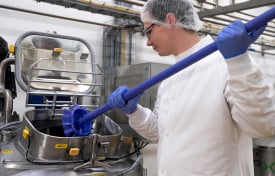Laboratory & QA/QC

- September 14, 2020
Forty years ago, DSM introduced Delvotest®, an easy to use, reliable, antibiotic residue test for farmers, dairies, and milk control laboratories. Today, Delvotest® is the gold standard for antibiotic residue testing in the global dairy industry, since it provides the confidence to meet increasingly stringent global legislation and quality demands.
When it comes to individuals daily food consumption, the last thing we seem to worry about is the presence of antibiotic residue in our meats or dairy products. But if a dairy cow had an antibiotic in its system that was designed to fight off a bacterial infection, the residue from the antibiotic could easily be carried over to the milk the cow produced, which is not good. If the entire tank truck of milk was contaminated with antibiotics, the whole thing must be discarded per the FDA.
- March 12, 2020
Nelson-Jameson has our own line of high-quality, low-cost branded pH buffers. Reference buffers are available in pH 4.01, 5.00, 7.00, and 10.01, and are manufactured for utmost accuracy and repeatability.
They are color-coded for ease of use when training new laboratory, operational staff, or a tenured laboratory technician. Feel confident that they will be free of contamination and tampering with a pressure-sensitive seal that bonds to the bottle as well as a safety seal and torque-testing to ensure the cap is secure.
A pH/temperature table is printed on the bottle label for accurate calibration. The buffers are NIST traceable, and are manufactured under ISO 9000 quality standards. They are available in different size packaging options such as 475 mL and 1 gallon to accommodate any size operation.
If you are looking for cost savings and a quality line of pH buffers suitable for any laboratory, contact a Product Specialist today for more information!
- September 10, 2019
At Nelson-Jameson, we never take chances when it comes to food safety, and neither should you. That's why we've put together a comprehensive flyer that is filled with the products you need to create an effective food safety program in your plant. Even more promising than the quality products is the manufacturers that are represented—we’ve included top products from 3M™, Hygiena™, Nasco, and Neogen®. Let us help you implement the Environmental Testing Solutions that work for your plant.
- May 16, 2017
In February I had the opportunity to attend the “Artisan Dairy Producer Food Safety Initiative Workshop” to learn about the Food Safety Modernization Act (FSMA) along with other leaders in the dairy industry here in Wisconsin. It was put on by the Wisconsin Cheese Makers Association and was offered at no expense thanks to a generous grant from USDA-NIFA. Marianne Smukowski, from the Center for Dairy Research (CDR) and Matt Mathison from the Wisconsin Milk Marketing Board (WMMB) were the trainers for the workshop. The workshop was a brief overview of the expectations that the FDA has put before every business in the food industry, from the large to the small plants. This workshop was geared towards the dairy industry, focusing on the hazards that arise, and how to put a detailed plan together to prevent them. One of the hazards that was of special interest, especially due to the sheer amount of news coverage that it has gotten in the previous months, was the elimination and prevention
- August 30, 2016
When I joined the lab team in May I was familiar with lab equipment and testing but I wasn’t familiar with luminometers and ATP. I had heard
- January 26, 2016
On March 22nd, Nelson-Jameson is excited to offer our “pH Workshop” at the University of Wisconsin-Baraboo/Sauk County. The course will be facilitated by Nelson-Jameson’s in-house pH expert, Steve Zdun. The workshop is perfect for an array of food and beverage industry producers to learn more about the basic principles of successful, and effective pH analysis in the processing environment.
Participants will garner insight into a host of topics, including: sample preparation techniques, choosing the best electrode/meter for the job, the importance of Automatic Temperature Compensation, calibration techniques, cleaning/maintenance procedures, and basic trouble shooting. Steve has also planned time for a question and answer session, as well as one-on-one consultation. By the end of the session that runs from 9am-12pm, class participants will leave with a constructive base of information to take with them into their facilities, as well as receive a
- January 13, 2016
When preparing 3M™ Petrifilm™ for use in your environmental monitoring program there are different hydration methods to follow, depending on the test and the context in which it is used.
For air or direct contact procedures where Aerobic Count, Coliform Count, E.coli/Coliform Count, Rapid Coliform Count or Enterobacteriaceae Count Petrifilm™ are being used, hydrate plates with 1 mL of appropriate sterile diluent. Allow hydrated plates to remain closed for a minimum of 1 hour before use. If using Staph Express Count Petrifilm™, hydrate plates with 1 mL of appropriate sterile diluent. Refrigerate hydrated plates for a minimum of 3 days before using.
For air testing using either Yeast and Mold Count or Rapid S. aureus Count Petrifilm™, hydrate plates with 1 mL of appropriate sterile diluent. Allow hydrated plates to remain closed for a minimum of 1 hour before use.
- October 21, 2015
Nelson-Jameson, Inc. and DSM are proud to announce a new Delvotest® Antibiotic Residue Tests website! Geared towards meeting the needs of dairy farmers, dairy labs, and artisan/farmstead operations, the site features information on an array of kits, troubleshooting tips, and order links.
As part of our mutual commitment to food safety, Nelson-Jameson, Inc. and DSM sought to create a site where users in the Americas could learn more about the dangers of antibiotic residues in milk and how to most effectively select and utilize Delvotest® products to both protect the public health and the economic vitality of their dairy/cheese operations.
To check out the Delvotest® site you can click here, enter “nelsonjameson.com/delvotest” into your web







